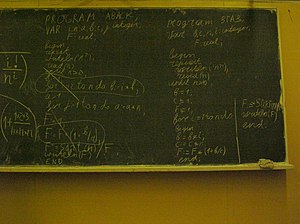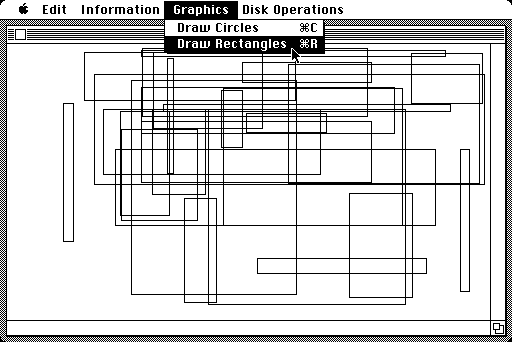Turbo Pascal is the world-standard Pascal compiler.
Turbo Pascal is an Integrated Development Environment (IDE) for Pascal language. Warning: Turbo Pascal is no longer maintained by its editor from 1995. Pour For recent Pascal language use Free Pascal here. Turbo Pascal,the world-standard Pascal compiler, adds Object-Oriented Programming. Combining the Simplicity of Apple's Object Pascal language with The Power and efficiency of C to create Turbo Pascal,the object-oriented programming language for the rest of us.
Turbo Pascal Features
* Inheritance
* Static & dynamic objects
* Constructors and Destructors
* Object constants
* Compiles @ > 34,000 lines/minute
* New integrated environment tutorial
* Hypertext Help with copy & paste
* Enhanced SMART linker & Overlay manager
* Support for Intel 8087, 80287, 80387 math co-processors
* Integrated source-level debugging
│English (en) │ français (fr) │
Mode MacPas tries to be compatible with the Pascal dialects commonly used on Macintosh, that is THINK Pascal, Metrowerks Pascal and MPW Pascal. For tips on porting from traditional Mac Pascal compiler to Free Pascal, see Porting from Mac Pascal
- 1Differences compared to standard Free Pascal
- 1.1Implemented (in 2.0.2)

Differences compared to standard Free Pascal
Here differences between the Macintosh dialect of Pascal and the standard dialect of Free Pascal (which is Turbo Pascal) are listed.

Implemented (in 2.0.2)
- The file extension .p is supported, in mode MacPas.
- The unit MacPas.pp is automatically included whenever mode MacPas is used. It should contain such stuff that is normally built in into Mac Pascal compiler.
- $CALLING MWPASCAL Tells the compiler to use calling conventions according to Metrowerks Pascal. The only difference to the default is that, in MWPASCAL, CONST record parameters are always passed by reference.
- Type checking of compile time expression (actually this is not MacPas specific)
- Compile time variable can be given on the command line, syntax -dMYCOMPVAR:=3 or -dMYCOMPVAR2:=TRUE (no spaces). Hexadecimal values are not supported, though.
Compile time constructs
- Compile time variables are now different from macros. However, they are related. In the FPC documentation, what is written about macros, is often also valid for compile time variables. The difference is that macro substitution is only done with real macros (which are defined by $DEFINEC). Compile time variables on the other hand are defined by $SETC.
- Exportable compile time variables/macros. Compile time variables and macros defined in the interface part of a unit are exported to other MACPAS units, in the same manner as ordinary Pascal constructs. See more below under Exportable macros.
- Compile time variables may be assigned to hexadecimal numbers, like $2345.
- $SETC <compvar>:= <expr> -- sets a compiler variable's value to an expression. ':=' as well as '=' are allowed. If not already defined, it is defined.
- $DEFINEC <macro> <content> defines a macro <macro>, whose substitution text is <content>. -- as its counterpart $DEFINE. Parameterised macros are not supported.
- $IFC, $ELSEC, $ENDC -- as their counterparts $IF, $ELSE, $END
- $ERRORC directive, similar to $ERROR
- UNDEFINED <compvar> -- in compiler variable expressions
- Compile time function OPTION(X), which returns, whether the compiler option X is set. Works for one letter options only.
- TRUE, FALSE -- as values in compiler variable expressions
- Compiler directive $PUSH and $POP, which saves/restores the current state of all local compiler switches.
- Compiler option $J makes a variable external
- Compiler option $Z makes variables and procedures externally visible
- Compiler option $OV (+/-) sets overflow checking (FPC 2.5.1)
- $ALIGN MAC68K, POWER, RESET (also POWERPC as equivalent of POWER in FPC 2.5.1)
- Compiler directive LibExport is recognized, but does nothing at the moment. It may be implemented in the future.
- Metrowerks compiler directive $UNDEFC and $ELIFC
- Metrowerks compile time expression DEFINED <compvar>
- Support for some Turbo/Delphi compiler directives as well, $DEFINE $UNDEF $IFDEF $IFNDEF $IF $ELSE $ENDIF $ELSEIF
Language
- Object Pascal, Mac style. New, Dispose, Member are supported.
- A procedure passed as parameter can be directly declared in the formal parameter list (anonymous procedure types).
- OTHERWISE in case constructs (actually it was already supported even for Turbo Pascal)
- Procedure Leave does the same as Break
- Procedure Cycle does the same as Continue
- Procedure Exit(<procname>), which works like Exit, but accepts the procname as parameter. <procname> must be the name of the procedure, in which Exit is used in. Non-local exit (as allowed in some Mac pascal implementations) is not allowed. Exit with return value as a parameter is not allowed. You can use 'return <exit_value>;' though, as in Metrowerks Pascal.
- Operators | and & (boolean operators, which are always evaluated as short-circuit boolean expressions)
- UNIV modifier for types in parameter lists is accepted, but does nothing (update, it has been implemented in FPC 2.5.1)
- C directive for procedure declarations. Same as CDECL.
- '..' in procedure declaration, denoting a C var arg style function.
- IMPLEMENTATION is not needed in units, if empty.
- External directive
- Procedures declared in the interface section, which do not have a counterpart in the implementation section, are considered external (we call them implicit externals). Their external name is prefixed with the C_prefix of the target. On Mac OS this is an empty string, whereas on Darwin/macOS it is an underscore, so that it will properly link with macOS' libraries (which are compiled with gcc).
- Ord function can take a pointer as argument
- Use of FourCharCode ( e. g. OSType, ResType) constants directly as parameters. This is done by an overloaded assignment operator defined in the file MacPas.pp
- Ord4
- All kinds of procedure variable stuff, compatible with Think Pascal and Metrowerks Pascal.
Implemented (in 2.1.1)
Turbo Pascal For Mac
- return <value>
- compile time expressions are now short circuit evaluated
- Bit-level packing of records and arrays
Planned
- Nested procedure parameters (allowing a nested procedure to be actual parameter to another procedure) (update, it has been implemented in FPC 2.5.1)
- Propagating uses
- Open (for files)
- HiWrd, LoWrd (since supported in both Think Pascal and Metrowerks)
Not Supported
Here is an (incomplete) list of mac pascal constructs which are not supported in mode mac at the moment, perhaps some of them will be supported in the future: Best note app for macbook.
- StringOf
- HiWord, LoWord (same as HiWrd, LoWrd)
- Implicit forward declaration of objects (In an object declaration, one cannot refer to an object not yet declared)
- In object declarations, the method name cannot be preceded with the class name (as in Think Pascal)
- Arithmetic compiler variable expressions
- Goto between different nesting levels (e.g., no goto from a nested procedure to a parent procedure)
- Exit between different nesting levels.
- Working implementation of UNIV keyword (update, it has been implemented in fpc 2.5.1)
Free Pascal constructs allowed in Mode MacPas
Turbo Pascal For Macos
Free Pascal constructs which currently are allowed in Mode MacPas, but which actually are not in the Macintosh dialect. If conflicts arises, some of them might be disallowed in future. Traditionally some of this functionality has been offered through Apple's Universal Interfaces. The list is not complete.
- Assign(filename, file). In Macintosh Pascal the file name is given as an (optional) parameter directly to Reset(file, filename), Rewrite(file, filename) or Open(file, filename) (Open do open for both reading and writing).
- Bitwise operators 'shr'. 'shl', 'and', 'or', 'not' etc. In Macintosh Pascal the functions BSR, BSL, BAND, BOR, BNOT are used instead. (Boolean operators 'and', 'or', 'not' is of course allowed in Macintosh Pascal)
- Assigned(pointer). An alternative is 'pointer <> nil'.
- Append, Blockread, BlockWrite, Erase (delete files from disk), Filesize, Flush, Rename, SeekEof, SeekEoln, SetTextBuf, Truncate.
- Addr, Compare*, *Seg, Fill*, Freemem, Getmem, High, Low, Move, MoveChar0, Ofs, Ptr (Note: In Apple's Universal Interfaces, Ptr is a datatype describing a generic pointer) , ReAllocMem, Release.
- Hi, Lo. For conversion to 16 bit integers, in Macintosh Pascal you can use HiWord, LoWord. Note that Hi/Lo work on 64, 32 and 16 bit integers and return the upper/lower 32/16/8 bits depending on the argument.
- Int
- BinStr, HexStr, OctStr, SetLength, SetString, StringOfChar, Val, Str
- ChDir, GetDir, MkDir, RmDir, Runerror
- Paramcount, Paramstr (since classic Mac OS does not have command line interface)
- Halt (param). Halt without parameter works in Macintosh Pascal.
- Assert
- Exclude, Include (for sets)
- LongJmp, SetJmp (exists in Metrowerks but not Think)
- Direct pointer arithmetics. In Macintosh Pascal, you must cast pointers to numbers before doing arithmetics.
Exportable macros
Only a mode MacPas unit will export macros and only a mode MacPas unit will import them. As before, MacPas and non-MacPas units can be used by each other but macros will then not be visible for use.
Symbols character map mac. Apple Mac OS X Character Viewer. The easiest way is to just go to the top menu bar and from there choose Edit Special Characters (at the very bottom). That way you can access Character Viewer at least in a lot of programs, one of them being Safari. Map for mac os x. The Best Free Map Software app downloads for Mac: MacGPS Pro Earth 3D - Amazing Atlas UTM Coordinate Converter GPS Tracks Magic Maps Road Tripper UTM. Track your geographic position using OS X. You can show traffic conditions in Maps so that you can plan the best route and leave enough travel time. How to show traffic conditions To browse the Maps User Guide, click Table of.
Macros will start to be exported right after the {$MODE MACPAS} directive. If no such directive is given, but -Mmacpas is given on the command line, macros will start to be exported right after the UNIT keyword.
Turbo Pascal For Windows 7
To support this, for a unit, {$MODE MACPAS} if forbidden after the UNIT keyword. For other mode switches it is like before.
Caveat 1: If {$MODE MACPAS} is given before UNIT, the macros defined between this point and UNIT is exported, if the unit is compiled as part of a program or other unit, but is not exported if the unit is compiled from the commandline (at top level). To be deterministic, do not put macros before UNIT.
Caveat 2: Deviation from Think Pascal and Metrowerks Pascal: Macros from used units is not in effect until after the whole uses clause (incl semicolon) has been parsed.
Apple's Universal Interfaces
Starting with FPC 2.04, Apple's Universal interfaces are included with FPC. They are from the same source tree that is available at http://www.microbizz.nl/gpc.html, only a slightly more recent version (r165 as of 2.0.4).
